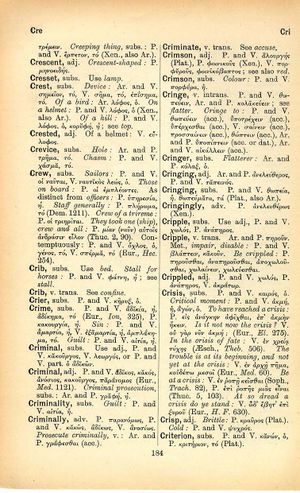crisis: Difference between revisions
ὦ δυσπάλαιστον γῆρας, ὡς μισῶ σ' ἔχων, μισῶ δ' ὅσοι χρῄζουσιν ἐκτείνειν βίον, βρωτοῖσι καὶ ποτοῖσι καὶ μαγεύμασι παρεκτρέποντες ὀχετὸν ὥστε μὴ θανεῖν: οὓς χρῆν, ἐπειδὰν μηδὲν ὠφελῶσι γῆν, θανόντας ἔρρειν κἀκποδὼν εἶναι νέοις → Old age, resistless foe, how do I loathe your presence! Them too I loathe, whoever desire to lengthen out the span of life, seeking to turn the tide of death aside by food and drink and magic spells; those whom death should take away to leave the young their place, when they no more can benefit the world
m (Text replacement - "<b class="b2">Theb.</b>" to "''Theb.''") |
m (Text replacement - "<b class="b2">5, I</b>" to "''5, I''") |
||
| Line 14: | Line 14: | ||
<b class="b2">The trouble is at its beginning, and not yet at the crisis</b>: V. ἐν ἀρχῇ [[πῆμα]], κοὐδέπω μεσοῖ (Eur., ''Med.'' 60). | <b class="b2">The trouble is at its beginning, and not yet at the crisis</b>: V. ἐν ἀρχῇ [[πῆμα]], κοὐδέπω μεσοῖ (Eur., ''Med.'' 60). | ||
<b class="b2">Be at a crisis</b>: V. ἐν ῥοπῇ κεῖσθαι (Soph., ''Trach.'' 82), P. ἐπὶ ῥοπῆς μιᾶς εἶναι (Thuc. | <b class="b2">Be at a crisis</b>: V. ἐν ῥοπῇ κεῖσθαι (Soph., ''Trach.'' 82), P. ἐπὶ ῥοπῆς μιᾶς εἶναι (Thuc. ''5, I''03). | ||
<b class="b2">At so dread a crisis do ye stand</b>: V. ὦδʼ ἔβητʼ ἐπὶ ξυροῦ (Eur., ''H.F.'' 630). | <b class="b2">At so dread a crisis do ye stand</b>: V. ὦδʼ ἔβητʼ ἐπὶ ξυροῦ (Eur., ''H.F.'' 630). | ||
}} | }} | ||
Revision as of 11:45, 7 August 2017
English > Greek (Woodhouse)
subs.
P. and V. καιρός, ὁ.
Critical moment: P. and V. ἀκμή, ἡ, ἀγών, ὁ.
To have reached a crisis: P. εἰς ἀνάγκην ἀφῖχθαι, ἐπʼ ἀκμὴν ἥκειν.
Is it not now the crisis? V. οὐ γὰρ νῦν ἀκμή; (Eur., El. 275).
In the crisis of fate: V. ἐν χρείᾳ τύχης (Aesch., Theb. 506).
The trouble is at its beginning, and not yet at the crisis: V. ἐν ἀρχῇ πῆμα, κοὐδέπω μεσοῖ (Eur., Med. 60).
Be at a crisis: V. ἐν ῥοπῇ κεῖσθαι (Soph., Trach. 82), P. ἐπὶ ῥοπῆς μιᾶς εἶναι (Thuc. 5, I03).
At so dread a crisis do ye stand: V. ὦδʼ ἔβητʼ ἐπὶ ξυροῦ (Eur., H.F. 630).

